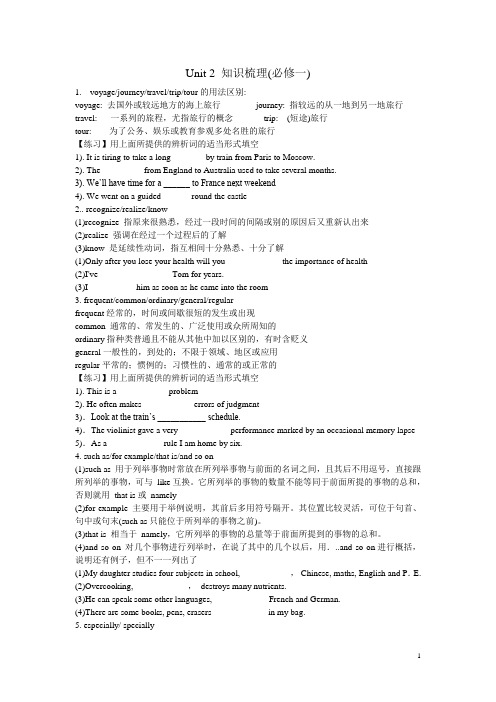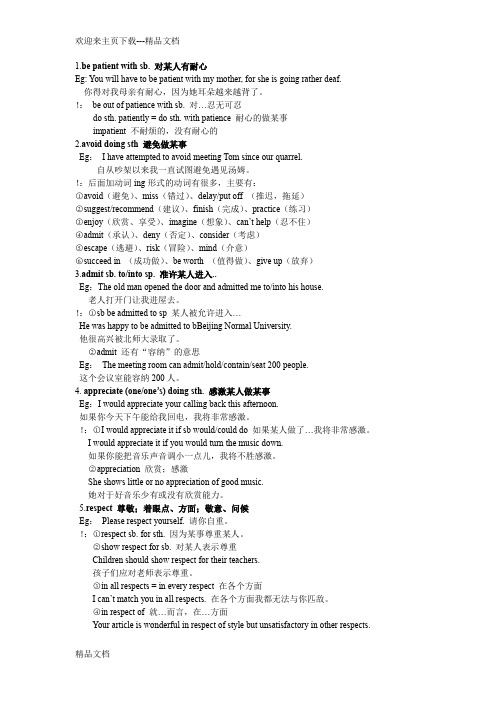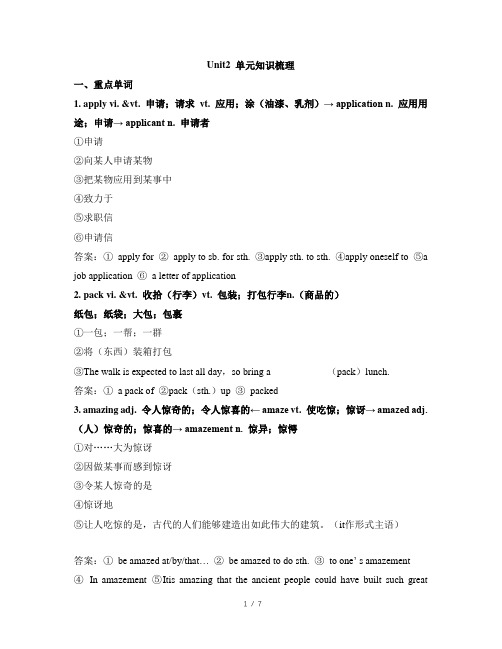英语必修一第二单元知识点梳理
高中英语必修一unit2知识梳理

Unit 2 知识梳理(必修一)1.voyage/journey/travel/trip/tour的用法区别:voyage: 去国外或较远地方的海上旅行journey: 指较远的从一地到另一地旅行travel: 一系列的旅程,尤指旅行的概念trip: (短途)旅行tour: 为了公务、娱乐或教育参观多处名胜的旅行【练习】用上面所提供的辨析词的适当形式填空1). It is tiring to take a long _______ by train from Paris to Moscow.2). The _________ from England to Australia used to take several months.3). We’ll have time for a ______ to France next weekend4). We went on a guided ______ round the castle2.. recognize/realize/know(1)recognize 指原来很熟悉,经过一段时间的间隔或别的原因后又重新认出来(2)realize 强调在经过一个过程后的了解(3)know 是延续性动词,指互相间十分熟悉、十分了解(1)Only after you lose your health will you ____________ the importance of health(2)I've ________________ Tom for years.(3)I __________ him as soon as he came into the room3. frequent/common/ordinary/general/regularfrequent经常的,时间或间歇很短的发生或出现common 通常的、常发生的、广泛使用或众所周知的ordinary指种类普通且不能从其他中加以区别的,有时含贬义general一般性的,到处的;不限于领域、地区或应用regular平常的;惯例的;习惯性的、通常的或正常的【练习】用上面所提供的辨析词的适当形式填空1). This is a ___________ problem2). He often makes ___________ errors of judgment3).Look at the train’s ___________ schedule.4).The violinist gave a very ___________ performance marked by an occasional memory lapse5).As a ____________ rule I am home by six.4. such as/for example/that is/and so on(1)such as 用于列举事物时常放在所列举事物与前面的名词之间,且其后不用逗号,直接跟所列举的事物,可与like互换。
最新英语必修一第二单元重要知识点整理

1.be patient with sb. 对某人有耐心Eg: You will have to be patient with my mother, for she is going rather deaf.你得对我母亲有耐心,因为她耳朵越来越背了。
!:be out of patience with sb. 对…忍无可忍do sth. patiently = do sth. with patience 耐心的做某事impatient 不耐烦的,没有耐心的2.avoid doing sth 避免做某事Eg:I have attempted to avoid meeting Tom since our quarrel.自从吵架以来我一直试图避免遇见汤姆。
!:后面加动词ing形式的动词有很多,主要有:○1avoid(避免)、miss(错过)、delay/put off (推迟,拖延)○2suggest/recommend(建议)、finish(完成)、practice(练习)○3enjoy(欣赏、享受)、imagine(想象)、can’t help(忍不住)○4admit(承认)、deny(否定)、consider(考虑)○5escape(逃避)、risk(冒险)、mind(介意)○6succeed in (成功做)、be worth (值得做)、give up(放弃)3.admit sb. to/into sp. 准许某人进入..Eg:The old man opened the door and admitted me to/into his house.老人打开门让我进屋去。
!:○1sb be admitted to sp 某人被允许进入…He was happy to be admitted to bBeijing Normal University.他很高兴被北师大录取了。
○2admit 还有“容纳”的意思Eg:The meeting room can admit/hold/contain/seat 200 people.这个会议室能容纳200人。
人教版高一英语必修一Unit2知识点梳理及练习(带解析)

人教版高一英语必修一Unit2知识点梳理及练习(带解析)1.重点词汇official adj 官方的.正式的.公务的voyage n 航行.航海conquer 征服.占领because of 因为native 本国的;本地的n 本地人.本国人come up 走近,上来.提出actually实际上,事实上base根据n 基部;基地,墓础at present 现在;目前gradual 逐渐的.逐步的enrich 使富裕;充实,改善vocabulary 词汇.词汇量.词表make use of 利用使用latter 较后的后平的;(两者中)后者的.fluent 流利的.流畅的frequent adj 频繁的.常见的usage 使用.用法.词语惯用法command命令;指令;掌握request请求;要求dialect 方言expression 词语;表示表达midwestern 中西部的.有中西部特性的African adj 非洲的:非洲人的;非洲语言的playa part ( in )扮演个角色:参与2.短语归纳1. 不只有一种英语more than one kind of English2. 在一些重要方面in some important ways3. 彼此不同be different from one another4. 与现代英语不同be different from modern / present day English5. 世界英语world Englishes6. 起着的重要作用play an important role / part7. 起着越来越重要的作用play a more and more /an increasingly important part / role8. 因为它特殊的作用because of its special role9. 国际语言an international language10. 在16世纪末at the end of the 16th century11. 在17世纪初at the beginning of the 17th century12. 在20世纪前期in the early 20 th century13. 比以往任何时候都than ever before14. 即使even if / even though15. 以德语为基础be based on German16. 使用更大的词汇量make use of a wider vocabulary17. 它自己的特色its own identity18. 众多讲英语的人 a very large number of English speakers19. 学英语的人数the number of people learning English20. 迅速增长 increase rapidly21. 标准英语 standard English22. 信不信由你believe it or not23. 讲最好的英语speak excellent English24. 相邻的城镇neighboring towns25. 从一个地方搬到另一个地方move from one place to another26. 充分利用不同的方言make full use of different dialects27. 目前的形势present situation28. 国际组织an international organization29. 词汇与惯用法vocabulary and usage30. 辨认出他的口音recognize his accent31. 中西部地区的方言midwestern dialect(s)32. 发出命令give commands33. 提出客气的请求make a polite request要点提炼Section A重要词语辨析重要词性变化重点词汇,短语,句式1.official adj.官方的;正式的;公务的You will have to get official permission to cut down the trees.你得获得官方批准才可以砍伐这些树。
人教必修一Unit2 单元知识梳理

Unit2 单元知识梳理一、重点单词1. apply vi. &vt. 申请;请求vt. 应用;涂(油漆、乳剂)→ application n. 应用用途;申请→ applicant n. 申请者①申请__________________②向某人申请某物___________________③把某物应用到某事中__________________④致力于_________________⑤求职信_________________⑥申请信_________________答案:①apply for ②apply to sb. for sth. ③apply sth. to sth. ④apply oneself to ⑤a job application ⑥a letter of application2. pack vi. &vt. 收拾(行李)vt. 包装;打包行李n.(商品的)纸包;纸袋;大包;包裹①一包;一帮;一群_________________②将(东西)装箱打包_________________③The walk is expected to last all day,so bring a ___________(pack)lunch.答案:① a pack of ②pack(sth.)up ③packed3. amazing adj. 令人惊奇的;令人惊喜的← amaze vt. 使吃惊;惊讶→ amazed adj.(人)惊奇的;惊喜的→ amazement n. 惊异;惊愕①对……大为惊讶______________②因做某事而感到惊讶_________________③令某人惊奇的是________________④惊讶地____________________⑤让人吃惊的是,古代的人们能够建造出如此伟大的建筑。
(it作形式主语)________________________________________________________________答案:①be amazed at/by/that… ②be amazed to do sth. ③to one’ s amazement④In amazement ⑤Itis amazing that the ancient people could have built such greatarchitecture.4. arrange vt. &vi. 安排,筹划→ arrangement n.安排;筹备①安排做某事__________________②为某人安排某事_________________③为……做安排/准备____________________④谈妥,达成协议__________________⑤The books were all neatly in place,carefully ____________(arrange).答案:①arrange to do sth. ②arrange sth. for sb. ③make arrangements for. ④arrive at/come to an arrangement5. recognise vi.辨别出;承认;认可;认识;认知recognition n.识别;承认,认出①通过……认出……________________②把……看作……_________________③认不出来_______________④大家都承认他是比赛中的最佳选手。
必修一英语Unit2知识点详解

Unit2(一)词汇1. commandn. & vt. 命令;指令;掌握The officer commanded his soldiers to fire. 那名军官命令士兵们开火。
A general is a man who commands a large number of soldiers.将军是统率众多士兵的人。
常用结构:①at/ by sb’s command 听某人支配②take command of 控制③in command of 指挥着④under one’s command 由某人的指挥⑤under the command of sb. 在某人的指挥下⑥command sb. to do sth. 命令某人做某事⑦command (=order) that ... 命令……(从句用虚拟语气,即should+ do 形式,should可省略)联想拓展commander n. 指挥官2. requestvt.&n. 请求;恳求;要求常用结构:①request sb. to do sth.请求某人做某事②request sth. from/of sb. 向某人要求某物③request that sb. (should) do sth.要求某人做某事④make a request/requests 发出请求⑤at the request of sb.=at sb.’s request依照某人的请求易混辨析request/demand/requirerequest表示“有礼貌的请求;正式的请求”。
demand表示“有正当权利的要求”,因此含有“坚决或强烈要求”的意思。
require表示“要求所必须的东西;法律、协定、规章以及其他客观情况的要求”。
但它们也有不同之处:Page No.47①require和request都可以接宾语+to do sth.结构,而demand没有此种用法。
高一英语必修1Unit2知识梳理、重点词汇解析人教版

人教版高一英语必修一Unit2知识梳理、重点词汇解析及单元自测Unit2一、知识点1. go to the pictures去看电影(美);go to the movies 去看电影(英)2. …list the countries that use English as an official language 列举把英语用作官方语言的国家3. the road to …通向……之路4. at the end of在……末端,在……尽头,by the end最后(=finally)5. because of 因为…… (注意和because 的区别)Many beautiful fish are fast disappearing because of the severe pollution.因为污染严重,许多美丽的鱼类正在面临绝种。
An argument was inevitable because they disliked each other so much.争论是不可避免的,因为他们彼此非常厌恶。
6. native English speakers 以英语作为母语的人7. even if (= even thoug)即使,用来引导一个让步状语从句,后面既可用陈述语气,也可用虚拟语气,但是even if/even though,引导的从句中不用将来时。
如:Even though/if it rains tomorrow, we will leave for Beijing.8. come up 走上前来,走近,发生,出现 come up with 追上,赶上,提出9. Actually all languages change and develop when cultures meet and communicate with each other.事实上,当不同文化相互交流渗透时,所有的语言都会有所发展、有所变化。
人教版高一必修一 第二单元知识点全面总结 归纳
必修一U2 English around the worldSection A1.more than one 不止一个Eg:More than one student was tired of his long and tiring speech.[误区警示]More than one +n. 意为“不止一个”,在语意上虽为复数,但做主语时,谓语动词用单数,相同用法的还有many a (许多)【拓展】(1)more than +num. 意为“超过,多于”,=overEg: I said hello to her more than one time, but she still ignored me.(2)more than +n. “不只是,不仅仅”,Eg:Both of us are more than workmates .We are close friend.(3) more than +adj./adv./v./分词意为“非常,很”,Eg:I was more than grateful for all your help.I’m afraid I’ve eaten more than enough .I was more than a little shaken by his deeds.The result more than disappointed all of us.(4)more than+句子(句中常含有can ,could),意为“非…所能….;是…难以…的。
”Eg: The road conditions there turned out to be very good, which was more than we could expect.[连接]No more than 仅仅,不超过=onlyNo more…than.. 和…一样不Not more than 不超过,至多No less than 不少于;多达More ….than …与其说….倒不如说…Less than 不足,不到;少于Rather than而不是Other than 除了2.voyage n. 航行;尤指航海或航空The sea became calm after the storm, so they decided to make a voyage . The scientist planned to go on a voyage to the Moon.[拓展]Make /take a voyage 去航海,去航行Go on a voyage 正在航海;正在航行表示动作Be on a voyage 正在航海;正在航行表示状态【辨析】voyage ,journey ,trip, tour, travelVoyage n.[C] 指海上旅行或航行Eg:he went on a voyage around the world.【辨析】Journey n. [C] 常指远距离的陆地旅行,也指“旅程,旅途”Eg:Wish you a pleasant journey.Trip n.[C]指短途,短期旅行,远足,也指“因事出行”They made a trip to the seaside last weekend .Tour n.[C,U] 指团队观光旅游,也可表示“巡视,巡回比赛”或“演出”Eg:I prefer a walking tour.The band is on tour in France.Travel n.[C,U] 常指长距离旅行,或国外旅行,是旅行的总称The novel is based on his travel in India.3.even if =even though 即使,虽然Eg:Even if he suffered from a lot of difficulties, he never gave in .【误区警示】①even if/even though 引导让步状语从句,主句用一般将来时,从句用一般现在时表示将来Eg:Even if I fail this ,I will try again.②as if/though 好像,仿佛引导方式状语从句或表语从句Eg:It looks as if it’s going to rain.e up(1) 走近;上前;赶上My teacher came up and talked with me face to face.(2)(被)提出,(被)谈到Eg: In order to finish the task on time, a good piece of advice came up at the meeting.(3)(太阳,月亮)升起;露出地面,发芽;出席,到场Eg:The sun has come up .She came up for the interview but didn’t get the job.The spring is coming and green grass is coming up.[误区警示] come up 做“被提出,被谈到”讲时为不及物动词短语,不能用于被动;come up with 主语为人,“提出”,宾语为表示“建议,计划,方案等”名词Eg:Your name came up in our conversation once or twice.She came up with a new idea at the meeting.【拓展】Come up to 达到(标准等),比得上Come on 赶快,加油Come about 发生Come across 邂逅,偶遇Come to 达到;苏醒,共计Come over走过来,顺便拜访Come out 出现;真相大白;结果是;出版;开花Eg: How did the problem come about?I come across an old friend t the party.5.actually adv.(1)(在口语中用于强调事实),实际上,事实上Eg:I don’t actually remember it.It seemed as if they fell in love with each other, but actually she disliked him. (2)(表示想法与事实不一致而感到惊奇) 居然;竟然He is actually over fifty years old.(3)(礼貌地纠正他人) 实际上,事实上Growing vegetables looks easy, but actually it takes a lot of learning .(4)(用于引起鄙人注意或转移话题)说实在的Actually ,I’m busy at the moment,--can I call you back later?[拓展]In actual fact=as a matter of fact =in reality/fact =actually 事实上;实际上6.base vt. 以…为根据n. 基部;基地;基础base…on/upon 把…建立,在…上be based on /upon 以…为基础;改编自One should always base his opinion on facts.In my dairy ,I set down a series of things that are all based on facts.They settled down at the base of the mountain.Do you know where the air base is? 空军基地These politics have a broad base of the masses.【辨析】Base 表示具体含义,意为“根基,基础,底座” the base of a building . 底座Basis 表示抽象含义,意为“基础”, the economic basis 基础【单词积累】Basic adj. 基本的,基础的;根本的Basically adv. 基本地;主要地7.at present =at the present time= in the present 现在,目前Eg: At present, I am suffering from a bad back.I’m getting along well with my new classmates at present.I’m very busy at present ,and I can’t join in your game .[拓展](1)present 做形容词时位置不同,意义不同;做前置定语,意为“现在的,当前的”;做后置定语时,意为“出席的,到场的”Eg:Did you see the present government leaders? 你见到现任政府领导人了吗Did you see the government leaders present ? 你见到在场的政府领导人了吗(2)做动词,意为“把…交给,颁发”。
高一英语必修一unit2知识点梳理
高一英语必修一unit2知识点梳理高一英语必修一Unit 2 知识点梳理Unit 2 of the first year of high school English curriculum covers various important knowledge points that are essential for students to master. In this unit, we delve into topics such as personal qualities, feelings, and relationships. To help students fully understand and grasp the key concepts, this article provides a comprehensive summary of the knowledge points covered in Unit 2.1. Vocabulary and Phrases1. personal qualities (个人品质)2. sociable (善于交际的)3. responsible (有责任心的)4. imaginative (富有想象力的)5. reliable (可靠的)6. sincere (真诚的)7. hardworking (努力工作的)8. considerate (体贴的)9. understanding (善解人意的)10. courageous (勇敢的)2. Grammar Points1. Comparative and superlative forms of adjectives (比较级和最高级形式的形容词)- Examples: "more sociable," "the most imaginative"2. Prepositional phrases of time and place (时间和地点的介词短语)- Examples: "on a sunny day," "at school"3. Verbs followed by gerunds or infinitives (动词+动名词或不定式)- Examples: "enjoy doing," "decide to do"3. Reading Comprehension1. Reading strategies (阅读策略)- Skimming and scanning- Understanding context clues2. Text analysis (文本分析)- Identifying main ideas and supporting details- Making inferences and predictions3. Vocabulary in context (上下文词汇理解)- Using context to determine meaning4. Writing Skills1. Descriptive writing (描写性写作)- Using adjectives and adverbs to create vivid descriptions- Organizing ideas and details logically5. Speaking and Listening1. Giving opinions and expressing agreement/disagreement (表达观点和赞同/不赞同)2. Effective communication strategies (有效的交流策略)- Active listening- Asking for clarification6. Cultural Awareness1. Understanding cultural differences (理解文化差异)- Personal qualities valued in different cultures- Etiquette and social normsBy reviewing and consolidating these knowledge points, students will be better prepared to understand and communicate effectively in English. It is essential to practice and apply these concepts in various contexts, both inside and outside the classroom, to enhance language proficiency.。
英语必修一第二单元重要知识点整理
1.be patient with sb. 对某人有耐心Eg: You will have to be patient with my mother, for she is going rather deaf.你得对我母亲有耐心,因为她耳朵越来越背了。
!:be out of patience with sb. 对…忍无可忍do sth. patiently = do sth. with patience 耐心的做某事impatient 不耐烦的,没有耐心的2.avoid doing sth 避免做某事Eg:I have attempted to avoid meeting Tom since our quarrel.自从吵架以来我一直试图避免遇见汤姆。
!:后面加动词ing形式的动词有很多,主要有:○1avoid(避免)、miss(错过)、delay/put off (推迟,拖延)○2suggest/recommend(建议)、finish(完成)、practice(练习)○3enjoy(欣赏、享受)、imagine(想象)、can’t help(忍不住)○4admit(承认)、deny(否定)、consider(考虑)○5escape(逃避)、risk(冒险)、mind(介意)○6succeed in (成功做)、be worth (值得做)、give up(放弃)3.admit sb. to/into sp. 准许某人进入..Eg:The old man opened the door and admitted me to/into his house.老人打开门让我进屋去。
!:○1sb be admitted to sp 某人被允许进入…He was happy to be admitted to bBeijing Normal University.他很高兴被北师大录取了。
○2admit 还有“容纳”的意思Eg:The meeting room can admit/hold/contain/seat 200 people.这个会议室能容纳200人。
人教版高一必修一 第二单元知识点全面总结 归纳
必修一U2 English around the worldSection A1.more than one 不止一个Eg:More than one student was tired of his long and tiring speech.[误区警示]More than one +n. 意为“不止一个”,在语意上虽为复数,但做主语时,谓语动词用单数,相同用法的还有many a (许多)【拓展】(1)more than +num. 意为“超过,多于”,=overEg: I said hello to her more than one time, but she still ignored me.(2)more than +n. “不只是,不仅仅”,Eg:Both of us are more than workmates .We are close friend.(3) more than +adj./adv./v./分词意为“非常,很”,Eg:I was more than grateful for all your help.I’m afraid I’ve eaten more than enough .I was more than a little shaken by his deeds.The result more than disappointed all of us.(4)more than+句子(句中常含有can ,could),意为“非…所能….;是…难以…的。
”Eg: The road conditions there turned out to be very good, which was more than we could expect.[连接]No more than 仅仅,不超过=onlyNo more…than.. 和…一样不Not more than 不超过,至多No less than 不少于;多达More ….than …与其说….倒不如说…Less than 不足,不到;少于Rather than而不是Other than 除了2.voyage n. 航行;尤指航海或航空The sea became calm after the storm, so they decided to make a voyage . The scientist planned to go on a voyage to the Moon.[拓展]Make /take a voyage 去航海,去航行Go on a voyage 正在航海;正在航行表示动作Be on a voyage 正在航海;正在航行表示状态【辨析】voyage ,journey ,trip, tour, travelVoyage n.[C] 指海上旅行或航行Eg:he went on a voyage around the world.【辨析】Journey n. [C] 常指远距离的陆地旅行,也指“旅程,旅途”Eg:Wish you a pleasant journey.Trip n.[C]指短途,短期旅行,远足,也指“因事出行”They made a trip to the seaside last weekend .Tour n.[C,U] 指团队观光旅游,也可表示“巡视,巡回比赛”或“演出”Eg:I prefer a walking tour.The band is on tour in France.Travel n.[C,U] 常指长距离旅行,或国外旅行,是旅行的总称The novel is based on his travel in India.3.even if =even though 即使,虽然Eg:Even if he suffered from a lot of difficulties, he never gave in .【误区警示】①even if/even though 引导让步状语从句,主句用一般将来时,从句用一般现在时表示将来Eg:Even if I fail this ,I will try again.②as if/though 好像,仿佛引导方式状语从句或表语从句Eg:It looks as if it’s going to rain.e up(1) 走近;上前;赶上My teacher came up and talked with me face to face.(2)(被)提出,(被)谈到Eg: In order to finish the task on time, a good piece of advice came up at the meeting.(3)(太阳,月亮)升起;露出地面,发芽;出席,到场Eg:The sun has come up .She came up for the interview but didn’t get the job.The spring is coming and green grass is coming up.[误区警示] come up 做“被提出,被谈到”讲时为不及物动词短语,不能用于被动;come up with 主语为人,“提出”,宾语为表示“建议,计划,方案等”名词Eg:Your name came up in our conversation once or twice.She came up with a new idea at the meeting.【拓展】Come up to 达到(标准等),比得上Come on 赶快,加油Come about 发生Come across 邂逅,偶遇Come to 达到;苏醒,共计Come over走过来,顺便拜访Come out 出现;真相大白;结果是;出版;开花Eg: How did the problem come about?I come across an old friend t the party.5.actually adv.(1)(在口语中用于强调事实),实际上,事实上Eg:I don’t actually remember it.It seemed as if they fell in love with each other, but actually she disliked him. (2)(表示想法与事实不一致而感到惊奇) 居然;竟然He is actually over fifty years old.(3)(礼貌地纠正他人) 实际上,事实上Growing vegetables looks easy, but actually it takes a lot of learning .(4)(用于引起鄙人注意或转移话题)说实在的Actually ,I’m busy at the moment,--can I call you back later?[拓展]In actual fact=as a matter of fact =in reality/fact =actually 事实上;实际上6.base vt. 以…为根据n. 基部;基地;基础base…on/upon 把…建立,在…上be based on /upon 以…为基础;改编自One should always base his opinion on facts.In my dairy ,I set down a series of things that are all based on facts.They settled down at the base of the mountain.Do you know where the air base is? 空军基地These politics have a broad base of the masses.【辨析】Base 表示具体含义,意为“根基,基础,底座” the base of a building . 底座Basis 表示抽象含义,意为“基础”, the economic basis 基础【单词积累】Basic adj. 基本的,基础的;根本的Basically adv. 基本地;主要地7.at present =at the present time= in the present 现在,目前Eg: At present, I am suffering from a bad back.I’m getting along well with my new classmates at present.I’m very busy at present ,and I can’t join in your game .[拓展](1)present 做形容词时位置不同,意义不同;做前置定语,意为“现在的,当前的”;做后置定语时,意为“出席的,到场的”Eg:Did you see the present government leaders? 你见到现任政府领导人了吗Did you see the government leaders present ? 你见到在场的政府领导人了吗(2)做动词,意为“把…交给,颁发”。
- 1、下载文档前请自行甄别文档内容的完整性,平台不提供额外的编辑、内容补充、找答案等附加服务。
- 2、"仅部分预览"的文档,不可在线预览部分如存在完整性等问题,可反馈申请退款(可完整预览的文档不适用该条件!)。
- 3、如文档侵犯您的权益,请联系客服反馈,我们会尽快为您处理(人工客服工作时间:9:00-18:30)。
2)____________she was late for school, she was criticized Because ( ) by her head teacher. what her head teacher said, she cried.
Because of 3)____________
4.A number of(许多) +ns (可数名词 )+ 谓v 复 & (许多) 可数名词 the number of ( …的数量)+ns (可数名词 )+谓v 单 的数量) 的数量 可数名词 谓
7) The number of people invited ______fifty but a number of them _____absent for different reasons. A) were; was B were; were C was; were D was; was
Do you like the boy named (name ) Li Lei ? ______ Do you like the boy __________ playing on/in the playground? (play ) basketball now (write ) by Lu Xun ?
written Do you like the novels ________
playing (play ) basketball now likes 6) The tall boy ______ written (write ) by Lu Xun. the novels ______
The (tall ) boy likes the novels. (句子主干部分) 句子主干部分) 句子主干部分
9. The way of doing sth/ the way to do sth/ the way (in wihich/that……)
I don’t like the way (in which/that ) he speaks. 10.Believe it or not, there is no such thing as standard English. (仿 ) Sorry, there is no such student named LI Lei in 仿 our class.
1. because (conj.连词 句子 连词)+ 连词 & because of (prep.介词 )+n./pron./doing sth. / wh介词 引导的句子。同义短语: 引导的句子。同义短语:______________________ Because of 1)_____________ illness/being ill, she was late for school.
7.request sb to do sth. &request that sb( should) do sth. mmand sb. to do sth.& command that sb. (should) do sth.
12)Our English teacher requests us to read English aloud every morning. =Our English teacher requests that we (should) read English aloud every morning. 8. Make (full/good) use of sth to do sth. 12) We should make full use of our time to study. should be made full use of to study. 变 =Our time ________________________________ (变 被动语态) 被动语态) Ten minutes has been made full ___ of ___ the problem. B ing; studying B. use; to study C. To use; to study D. use; studying
playing table tennis and listening to music.
namely/that is 9) I have three hobbies ______________ reading books, playing table tennis and listening to music.
3. n. (doing.) 现在分词作定语 &n. (done) 过去分 词作定语
------Look, a girl is drawing a picture.
drawing -----Oh, the girl _________ (draw ) a picture now is my younger sister. drawn ----Oh, My God! The picture ______ by her looks beautiful.
2. Even if/though即使 & as if/as though好像 即使 好像 asif/as though 4) He speaks English fluently ________________ he were )
a native speaker. 5) I won’t give up learning English even if/even though I __________________ (should ) fail a hundred times.
10)The students in our class are good at English. ________
For example
Li Lei can communicate with foreigners in English fluently.
6. recognize(认出;承认)& know (认识;了解) 认出; 认识; 认出 承认) 认识 了解)
5.For example举例 (举一个例子一般后跟句子)& 举例 举一个例子一般后跟句子) such as例举 例举许多事物一般后跟 例举(例举许多事物一般后跟 例举 例举许多事物一般后跟n./doing sth. ) & namely/ that is 即 (把例举的事物举完) 把例举的事物举完 举完) such as 8) I have a number of hobbies _________ reading books,
11. 插入语结构:特殊疑问词+do you 插入语结构:特殊疑问词+do
think\suggest\believe\suppose\guess +特殊疑问句的剩余部分 特殊疑问句的剩余部分
B ------- be sent to work there?
A. Who do you suggest that should B. Who do you suggest C. Do you suggest whom D. Do you suggest who should
